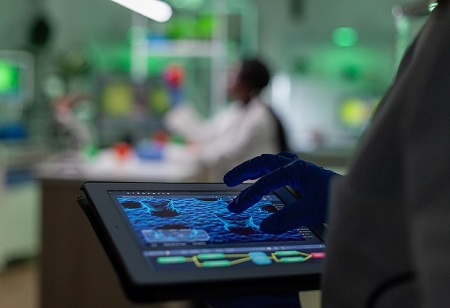Rejith P R, Correspondent, India Pharma Outlook

Approximately 48% of organizations in the healthcare and pharma sectors plan to integrate their first generative artificial intelligence solution within one year. While 28% of the firms have already implemented AI technology in their business operations and Merck was the first pharmaceutical firm to launch AI solutions to integrate discovery and synthesis. Their software can combine with generative AI and machine learning to speed up drug development.
Pharmaceutical and biotech companies are adopting more efficient and automated processes based on data-driven decisions and predictive analytics tools to keep up with the contemporary business environment. The next evolution of this approach involves advanced data analytics incorporating Gen AI solutions and machine learning.
In this article we will focus on the potential of Gen AI soltions and how it can impact the pharma sector.
In this modern era, GenAi solutions play a significant role in the pharmaceutical sector; they have the ability to take things ahead for personalized medicines. More importantly, this latest technology uses data related to genetics to point out unique genetic markers and changes in patients, making the process seamless in offering more accurate and targeted therapies. Pharmaceutical organizations can effectively utilize these to develop medicines customized to mankind's genetic profiles, increasing efficacy and lowering adverse effects. Eventually, the transformation towards personalized medicine shows a typical example in the sector's approach to treatment, creating some distance from the one-size-fits-all model.
For instance, Novartis has used AI solutions for personalized medicines and targeted therapies. With AI algorithms, they evaluate plenty of genomic datasets, empowering the recognizable proof of explicit hereditary markers. By taking this approach, therapies can customized to every patient, treatment outcomes can be improved, and side effects can be reduced.
The technologies have significantly improved, and the pharma companies are leveraging the advanced GenAi solution in drug discovery and development for a positive outcome. The process becomes seamless with the GenAi computational capabilities as it examines a vast number of datasets at unprecedented speeds. The traditional methods take time and are very expensive, and the amount of time it takes to deliver a new drug to the market is high. When it comes to GenAI makes the process efficient by quickly identifying crucial drug candidates, anticipating their safety profiles, and improving formulations. Moreover, this advancement helps lower costs for pharma companies and speeds up the delivery of medications.
Roche Holding AG, a multinational healthcare company from Switzerland, is utilizing artificial intelligence to discover new drugs. They have also integrated AI into their research and development processes to improve and enhance drug development success rates.
Dr. Kanav Kahol, CEO, DIVOC Health & Pink Tech Design said "At one end lies using telemedicine to enable care and at the other end we have use of AI to help in drug discovery"
In medical research, clinical trials are crucial and imperative for assessing the safety and efficacy of interventions and new treatments. The Gen Ai solution has launched predictive analytics into the planning and implementation of clinic trials. How does it work? First of all, the analyses of genetic and clinical data will be performed. Also, AI algorithms can find the appropriate patient count, forecast side effects, and improve trial designs. The pharma sector can benefit from costs, shortened timelines, and success rates, which eventually translate into more accessible patient treatment.
For instance, Pfizer has integrated AI technology for predictive analytics in clinical trials. Their advanced AI algorithms can analyze the various datasets, which comprise clinical and genetic details, and this process helps in forecasting patient responses, finding the right trial population, and improving trial designs for maximum efficiency.
With the effective utilization of generative AI, pharmaceutical organizations can easily identify novel uses for current drugs through cutting-edge data analysis. By having a clear picture of the genetic basis of ailments, firms can think about the repurposing of existing drugs for the latest indications; time and resources can be saved in contrast with the development of entirely new compounds.
Moreover, AI technology also helps to improve drug-related work by identifying gaps and significant areas for expansion. Pharma firms can focus more on allocating resources more efficiently with this approach and with the greatest therapeutic potential.
AstraZeneca, a giant firm in the pharma industry, makes use of AI for drug repurposing and AI algorithms to examine heaps of datasets, which include molecular and clinical information.
In a nutshell, the pharmaceutical industry is trending, and the advancements with Gen AI solutions will shape the companies with a significant transformation in drug discovery, personalized medicine, and improved clinical trials. The benefits are abundant with the integration of AI technology. Still, other factors such as compliance, ethical consideration, and partnership approaches have challenges that must be addressed and ways to fix them. Undoubtedly, pharma companies will transform the healthcare sector by embracing AI's power, which will also help to progress the drug discovery process and lead to better patient care.